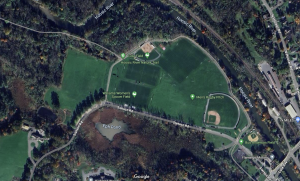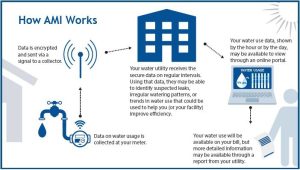Campus and Community Projects
Advancing Our Shared Sustainability Goals
The college is developing two projects that serve campus and community sustainability goals.
Study for Ecological Restoration and Stormwater Management at Eph Pond
Williams College seeks federal funds for a study to restore the ecological integrity and enhance the stormwater absorption and resilience capacity of a freshwater pond and connected wetlands located on the northern edge of its campus in Williamstown, MA, adjacent to the Hoosic River. The area’s substantial functional values include wildlife and endangered species habitat, groundwater discharge/recharge, sediment retention and stream bank stabilization, as well as community recreation and education. The pond and its surrounding palustrine forest, scrub shrub, and emergent marsh wetlands have been impacted and impaired by increasing sediment accumulation from stormwater runoff and emergent vegetation that is taking over the open water habitat within this valuable ecological system. The requested funding would enable an ecologically sensitive dredging study as a first step towards the upgrade and redesign of the college’s green infrastructure in the area to reduce increased flooding events and enhance climate resilience.

Resource Conservation through Remote Water Metering
The proposed project represents an innovative and beneficial partnership between Williams College and the surrounding Town of Williamstown, Massachusetts to increase drinking water management and conservation and reduce greenhouse gas emissions. Currently, Town residents and the college do not have the ability to monitor their water use in a detailed, realtime fashion. Instead, they receive monthly or quarterly invoices for their total consumption during the billing cycle. This inefficient system means lost opportunities for water conservation and financial savings. Furthermore, the Town and college are dependent on a single groundwater aquifer for their drinking water supply, requiring the sustainable stewardship of this limited supply. The proposed project entails the installation of remotely readable smart water meters at ~2,200 town residences and at 55 college buildings. In addition, a remote-communication signal repeater will be installed near the top of the college’s physical plant smokestack to amplify the meters’ signals and enable them to be read and captured digitally for integration into the water service billing system. The project would generate the following benefits for town residents, the Town, and the college:
- More accurate readings that allow residents and the college to pay only for the water they actually use by reducing the potential for errors,
- Early notifications of a change in use such as leaks, malfunctioning irrigation systems, etc., that facilitate faster response times and minimizing potential property damage and supports water conservation efforts,
- Collection of real-time data that will help the Town, residents and the college identify areas of high water usage and implement targeted conservation initiatives,
- Remote monitoring of water meters reduces the need for vehicle travel around Town and campus to read meters using proximity-readers, the resulting time savings would enable Town and college staff to use their time more productively, and
- The above benefits represent appropriate uses of federal taxpayer funding and demonstrate measurable benefits to the Williamstown community and the sustainable stewardship of our local groundwater resources.
